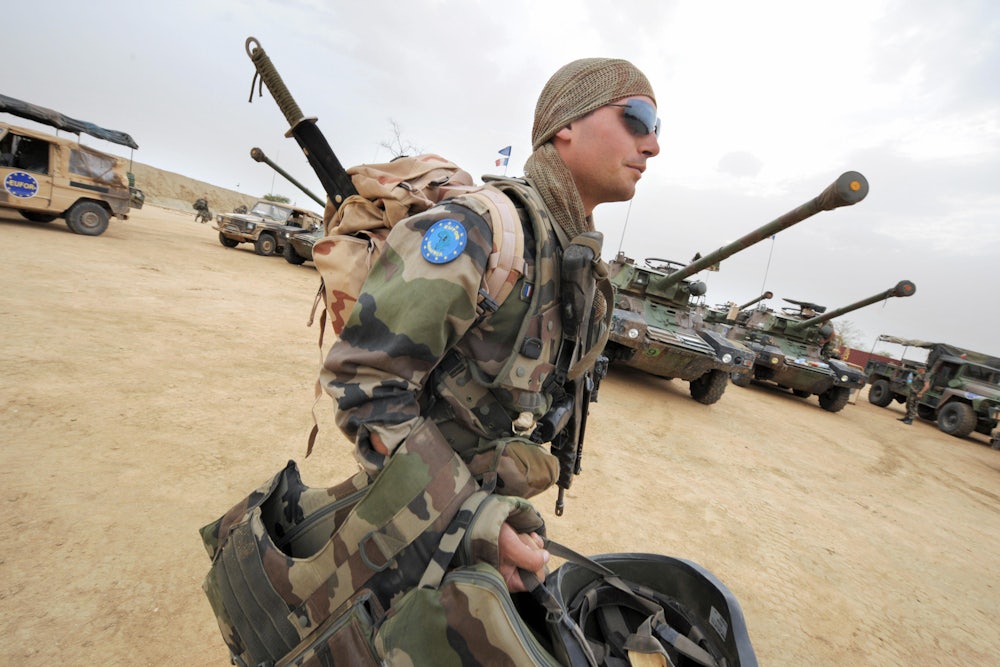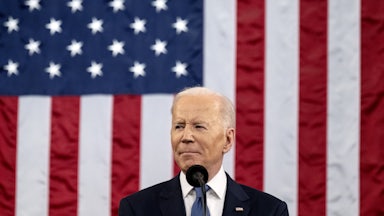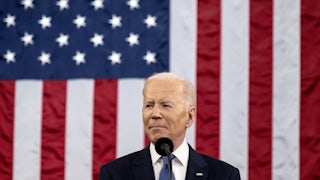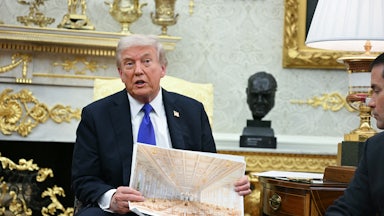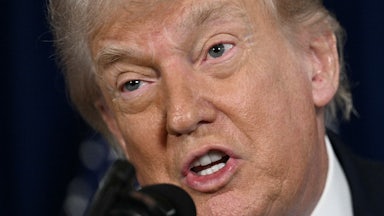One of the best apocryphal quips from the Cold War was attributed to Henry Kissinger. In 1973, the then–Secretary of State is said to have cast doubt on the possibility of Europeans uniting to assume leadership for their own security with a famous question: “Who do I call if I want to speak to Europe?” The line was likely never spoken, but it has become famous anyway, since it illustrates an obvious problem that is often ignored when Europe is spoken of as a single entity. Europe might be identifiable on an atlas, but politically it is as complex as any David Lynch film or Yes album.
That reality has long stifled efforts by some European countries to join forces (literally) and act in unison for their common defense. It’s one reason why the United States assumed responsibility for Western Europe’s security after World War II. After the Cold War ended, Central and Eastern European countries were eager to be protected by NATO, which is de facto led by the U.S. And now, with Russia destroying Ukraine, Pentagon officials are talking about lining Eastern Europe with bases. Finland and Sweden, countries that border Russia but are culturally more similar to Western and Northern Europe, are discussing joining NATO as soon as possible.
These rushed decisions carry long-term consequences, however. The U.S. would be taking on even more burdens overseas at a time when there is not strong domestic support for doing so, in Europe or anywhere else. There is no major interest at stake for the U.S.; deterring Russia from invading another Eastern European country would be important, but a second-order interest. And expanding American security commitments discourages allies from being self-reliant. Instead of hurried plans to extend the American security umbrella even further, it would be wise to strengthen efforts to form a European common defense system.
The U.S. has faced this scenario before. As World War II progressed and the Allied countries reversed the Axis successes, Franklin Roosevelt and other planners began to imagine what a postwar world would look like. Various schemes were discussed, including a proposal suggested by Treasury Secretary Henry Morgenthau to entirely deindustrialize mighty Germany so that it would never menace others again. The Morgenthau Plan received more support than is commonly remembered, but for multiple reasons American officials dropped it in favor of reviving West Germany—the half of Germany that the Allies occupied—as part of an integrated Western Europe. With good reason, French and British leaders were skeptical if not terrified of a resurrected Germany, however, and all parties were desperate for American reassurance they wouldn’t be abandoned, as had happened after World War I.
Still, some farsighted French statesmen imagined a free, united Europe, and the Truman administration pushed Germany, France, and other countries to form the European Coal and Steel Community, the forerunner to the European Union. President Dwight Eisenhower consistently hoped to reduce the American presence in Europe so that the Western half could take more actions to look after itself. Well into the 1960s, American officials still spoke about a united Western Europe as a project they encouraged. The eventual European Union that formed does many things well, but its defense capabilities are very limited.
This goal of a self-reliant European defense force proved unreachable for two reasons. The first is that while American officials liked the idea of a Western Europe assuming greater responsibility for its security, they had trouble relinquishing control. In his new book Uncertain Allies: Nixon, Kissinger, and the Threat of a United Europe, the historian Klaus Larres writes that Richard Nixon’s administration marked the turning point at which American officials started to see “Europe” not as an ideal but as a threat, because in relative terms American power was declining and Western Europe’s was rising. Nixon and Kissinger, his national security advisor, “began to perceive the unity of Europe and the increasingly self-confident, if not ‘uppity’ Europeans as serious threats to the United States’ economic well-being and geopolitical dominance in the long run,” writes Larres. American leaders liked the idea of European countries coughing up more resources for their defense but disliked the prospect of having less influence over Western strategy and decision-making.
But there was another challenge to a united Europe. The thing called Europe is actually 50 separate sovereign states, plus eight entities with some recognition as sovereign states (including Kosovo), six dependent territories (with some independence but no unique status as a separate state), and additional areas with special political status (such as Northern Ireland). Only 27 countries are part of the European Union, and just 44 are U.N. members. Further complicating things is that Russia, Turkey, and other countries are transcontinental, located in both Europe and Asia. And then Armenia and Cyprus are considered European countries, but geographically they are located outside Europe.
Think how hard it is to coordinate five of your friends when making dinner reservations. Now imagine trying to line up 50 countries, each with unique histories, cultures, and often languages. Keep in mind that these states range from powerhouses like Russia and Germany to small fry like San Marino and Liechtenstein.
From a defense standpoint, this makes cooperating on anything rather maddening. An overarching problem is that European countries have different perceptions about what poses threats. Russia poses a much greater threat to, say, Poland than it does to Portugal, for instance. That makes Portugal (and other Western European countries) less interested in resisting Russian aggression in Ukraine or elsewhere than are countries in Eastern or Central Europe. On terrorism, global warming, China, and other issues, no unanimity exists in Europe. Each state has a different idea about what should be defended against, how it should be done, and who should devote resources toward the problem. In a journal article last year, the political scientists Stephen Brooks and Hugo Meijer cited this “strategic cacophony” as an insurmountable problem to European self-reliance.
The U.S. has long solved this problem by being the out-of-continent provider of European security. NATO rather than the EU is the security organization of choice, with the U.S. shepherding its members, running the command systems, and, not least of all, providing most of the equipment used. After the Cold War ended, the conflict in the former Yugoslavia presented a new opportunity to other European nations to show whether they could act in concert to stop the bloodshed. As Maynard Glitman wrote, “the Yugoslav crisis arose as the Cold War came to an end and when Western Europeans, optimistically envisaging the emergence of a powerful European Union … were eager to demonstrate their ability to take on a major political-security relationship in Southern Europe.” The United Nations and European countries proved unequal to the task, and the result was catastrophe.
But depending on the U.S. (including under the NATO umbrella) to provide most Europeans with their security carries costs to both parties. It was one thing to hope that the American people would be willing to go to war to prevent the Soviet Union from dominating Europe. It’s another to hope that they will be willing to do so to protect Finland—which shares a 930-mile border with Russia. Just 30 percent of Americans support a no-fly zone in Ukraine if it means shooting down Russian planes. That’s not a sustainable basis for long-term support to defend Eastern European countries in wartime. If Russia ever calls NATO’s bluff and invades a member state, the American public may revolt at the prospect of sending troops to die in places that do not threaten the country’s security.
Moreover, while European countries may not be able to act in complete unity anytime soon, they can certainly do more to be self-reliant than they have been. Germany’s sudden enthusiasm for defense spending and sanctions illustrates the huge possibilities if the continent’s most powerful economy gets involved. Britain and France are also leading the way in increasing their contributions to common European capacities. Farsighted American officials can harness this energy to prepare more robust, long-term cooperative security arrangements within Europe, sharing technologies and solving coordination issues. In the long-term, this project would do far more to secure a stabilized continent than enlarging an unsustainable American-dominated system. The Biden administration was making gestures toward this pan-European endeavor before Russia invaded Ukraine, and it should utilize the current crisis as a way to double down on its efforts instead of building new bases encircling a paranoid, angry Russia.
After all, in 2009 the European Union even announced there is finally a number for Henry Kissinger to call if he wants to reach Europe.
